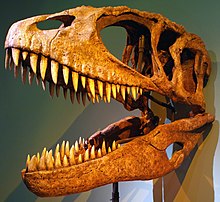鲨齿龙属
鲨齿龙屬 化石時期: 白堊紀早期至中期,100–93 Ma PreЄ Є O S D C P T J K Pg N | ||||||||||||||||||||||||
|---|---|---|---|---|---|---|---|---|---|---|---|---|---|---|---|---|---|---|---|---|---|---|---|---|
 | ||||||||||||||||||||||||
科學分類 | ||||||||||||||||||||||||
| ||||||||||||||||||||||||
種 | ||||||||||||||||||||||||
|

鯊齒龍的牙齒與一枚25美分硬幣的比較。
鲨齿龙屬(屬名:Carcharodontosaurus)又名望齒龍、噬齒龍、噬人鯊龍,屬於獸腳亞目鯊齒龍科,生活於白堊紀的阿爾比階晚期到森諾曼階早期,約1億到9300萬年前。鯊齒龍是種巨大的肉食性恐龍,比暴龍大。
鯊齒龍的屬名意為「擁有鯊魚牙齒的蜥蜴」,是以鯊魚的屬名Carcharodon為名;carcharo意為「鋸齒狀的」,odonto意為「牙齒」,而saurus意為「蜥蜴」[1]。
目录
1 解剖及形態學
2 發現及分類歷史
3 大眾文化
4 參考
5 外部連結
解剖及形態學

數種巨型獸腳類恐龍的體型相比。從左到右為:棘龍、鯊齒龍、南方巨獸龍、暴龍
鯊齒龍是已知最大型、最重的獸腳類恐龍之一,仅次于棘龙。根據不同科學家的估計值,撒哈拉鯊齒龍的身長約在12到13公尺之間,體重約在6到15公噸之間[2][3][4]。由於伊吉迪鯊齒龍的頭骨更大,伊吉迪鯊齒龍的身長可能超過13公尺。
鯊齒龍是肉食性恐龍,有巨大的嘴部,及達8英吋長的鋸齒狀牙齒。古生物學家曾一度認為鯊齒龍的頭顱骨是獸腳亞目中最長的。可是因為原有的非洲頭顱骨中缺少了前上頜骨及方骨,導致了對其實際大小的錯誤估計。有研究指撒哈拉鯊齒龍的頭顱骨實際是1.6米長;而新發現的伊吉迪鯊齒龍(C. iguidensis),頭骨長達1.75公尺[5]。目前最長、大的頭顱骨屬於鯊齒龍的近親南方巨獸龍,估計可達1.95公尺[6]。
撒哈拉鯊齒龍的顱腔及內耳結構很像鱷魚[7]。大腦與整個腦部的相對大小,類似爬行動物,但較虛骨龍類及鳥類為小。
發現及分類歷史

鯊齒龍的頭顱骨模型
鯊齒龍化石最先是由Charles Depéret及J. Savornin於1927年在北非所發現,發現於阿爾及利亞的卡瑪卡瑪組(Kem Kem Formation),地質年代為阿爾比階[8]。原先被歸類為斑龍的一個種,撒哈拉斑龍(Megalosaurus saharicus)。在1931年,恩斯特·斯特莫(Ernst Stromer von Reichenbach)改建立為鯊齒龍屬,模式種是撒哈拉鯊齒龍(C. saharicus),並沿用至今。他斯特莫命名鯊齒龍的原因,是因為牠們有著類似噬人鯊屬的牙齒,而這牙齒並非彎曲,幾乎是兩邊對稱而前緣凸[1]。這個鯊齒龍的首個化石在第二次世界大戰中被毀。在1996年,保羅·塞里諾(Paul Sereno)在摩洛哥的卡瑪卡瑪組發現了鯊齒龍的頭蓋化石[9]。
在2007年,塞利諾也發現了鯊齒龍屬的另一個物種,在上頜骨、腦殼與撒哈拉鯊齒龍有所差異。這一新的物種是1997年在尼日發現,並在2007年命名為伊吉迪鯊齒龍(C. iguidensis)[10]。
大眾文化
鯊齒龍並不被一般大眾所熟知。但鯊齒龍已在探索頻道的電視節目《恐龍星球》(Dinosaur Planet)中出現過,但該節目錯誤地敘述鯊齒龍生存於南美洲,以薩爾塔龍為食;鯊齒龍其實生存於阿爾比階到森諾曼階的非洲北部,而薩爾塔龍生存於坎潘階到馬斯垂克階的南美洲。
鯊齒龍還出現在探索頻道的電視節目《Monsters Resurrected》,在節目中鯊齒龍與同時代的棘龍發生衝突,但很快的就被棘龍殺死。[11]。
鯊齒龍也在某些電子遊戲中出現,例如《侏羅紀公園:基因計劃》(Jurassic Park:Operation Genesis)與《帕拉世界》(ParaWorld)。
參考
^ 1.01.1 Stromer, E. (1931). "Wirbeltiere-Reste der Baharijestufe (unterestes Canoman). Ein Skelett-Rest von Carcharodontosaurus nov. gen." Abhandlungen der Bayerischen Akademie der Wissenschaften, Mathematisch-naturwissenschaftliche Abteilung, 9(Neue Folge): 1–23.
^ Sereno, P. C., D. B. Dutheil, M. Iarochene, H. C. E. Larsson, G. H. Lyon, P. M. Magwene, C. A. Sidor, D. J. Varricchio, and J. A. Wilson. (1996). "Predatory dinosaurs from the Sahara and the Late Cretaceous faunal differentiation." Science, 272: 986–991.
^ Seebacher, F. (2001). "A new method to calculate allometric length-mass relationships of dinosaurs." Journal of Vertebrate Paleontology, 21(1): 51–60.
^ Therrien, F.; and Henderson, D.M. My theropod is bigger than yours...or not: estimating body size from skull length in theropods. Journal of Vertebrate Paleontology. 2007, 27 (1): 108–115. doi:10.1671/0272-4634(2007)27[108:MTIBTY]2.0.CO;2. 引文使用过时参数coauthors (帮助)
^ Briggs, Helen. New meat-eating dinosaur unveiled (Web). News article about; Carcharodontosaurus iguidensis was one of the largest meat-eaters that ever lived. BBC NEWS. 12 December 2007.
^ Calvo, J.O., and Coria, R.A. (1998) "New specimen of Giganotosaurus carolinii (CORIA & SALGADO, 1995), supports it as the largest theropod ever found." 互联网档案馆的存檔,存档日期2008-02-16. Gaia, 15: 117–122.
^ Larsson, H.C.E., 2001. Endocranial anatomy of Carcharodontosaurus saharicus (Theropoda: Allosauroidea) and its implications for theropod brain evolution. 19-33 in D.H. Tanke & K. Carpenter (eds.), Mesozoic Vertebrate Life. Indiana University Press, Bloomington.
^ Depéret C. & Savornin J. Sur la découverted' une faune de vertébrés albiens à Timimoun (Sahara occidental). Comptes rendus de l' Académie des Sciences (Paris). 1927, 181: 1108–1111.
^ Brusatte, S. and Sereno, P.C. (2005). "A new species of Carcharodontosaurus (Dinosauria: Theropoda) from the Cenomanian of Niger and its implications for allosauroid phylogeny." Journal of Vertebrate Paleontology, 25: 40A.
^ Brusatte, S.L. and Sereno, P.C. (2007). "A new species of Carcharodontosaurus (dinosauria: theropoda) from the Cenomanian of Niger and a revision of the genus." Journal of Vertebrate Paleontology, 27(4): .
^ 存档副本. [2009-12-12]. (原始内容存档于2009-12-12).
外部連結
鯊齒龍 - DinoData
發現鯊齒龍的新種- Science daily

Comments
Post a Comment